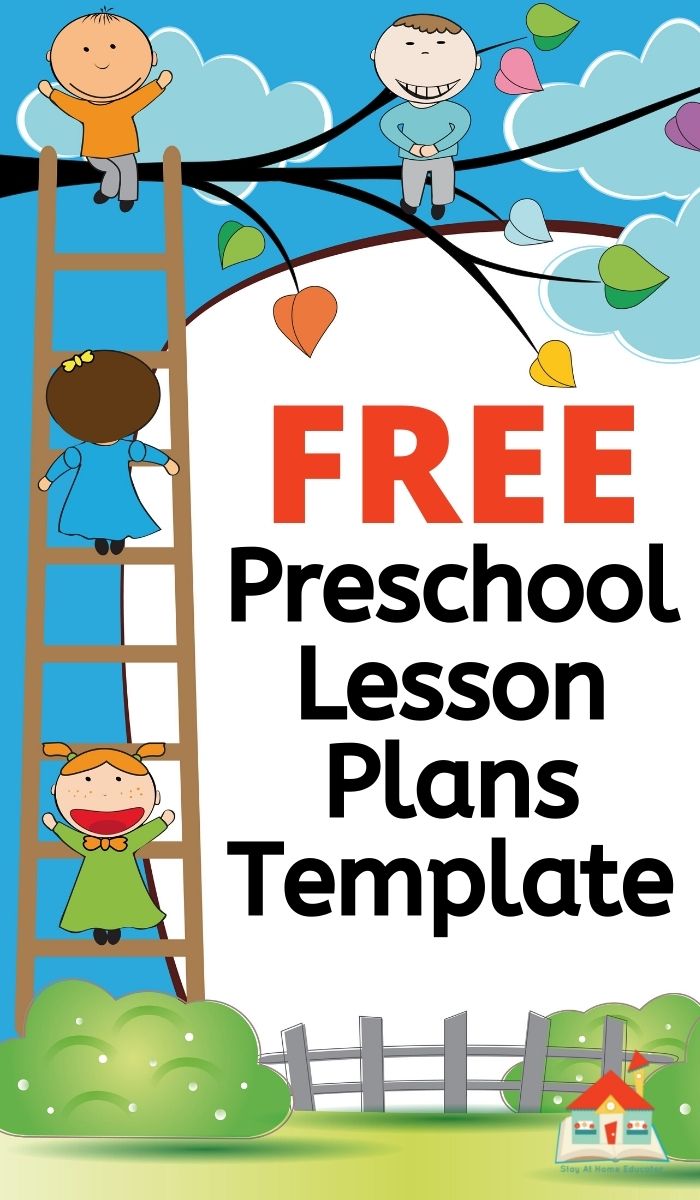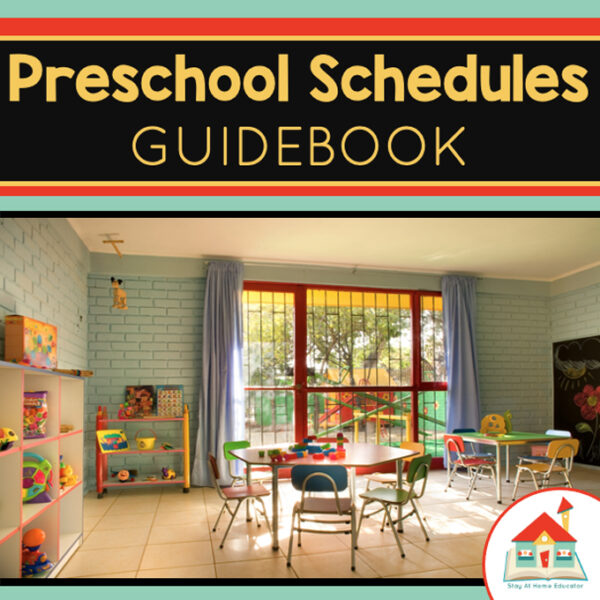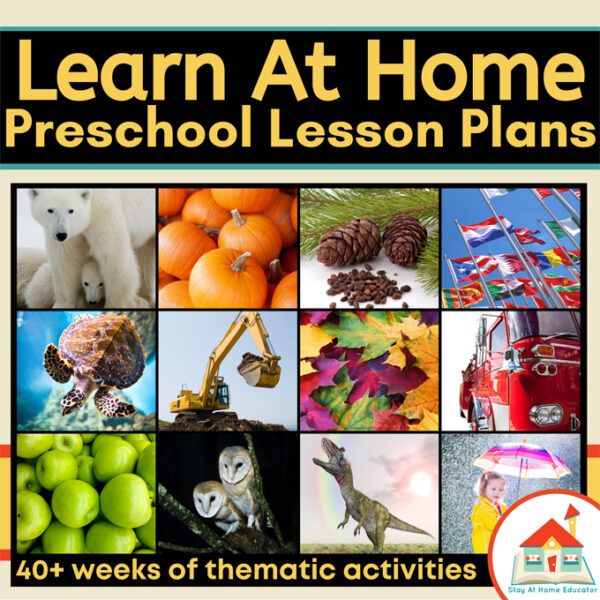
If you are looking for ideas to help you streamline your preschool planning, you’ve come to the right place! Our FREE preschool lesson plan template written out in this post will help you plan with ease and confidence, with just a few easy steps.
Whether you prefer to plan day by day, a week at a time, or the whole year at once, having a plan helps keep your lessons focused and intentional on what your students need.

There are many ways to go about writing preschool lesson plans, and chances are that any preschool teacher will try out a few different approaches before settling on one.
Lesson planning can be time-consuming, so finding an approach that works is important because children’s education depends on well-thought-out lesson plans with excellent execution.
Whether you use weekly planning, monthly plans, or unit-based focus, having a developmentally appropriate scope and sequence that was carefully developed is a valuable tool to help keep you and your students on track.
A scope and sequence is a list of monthly goals and objectives that build upon one another to ensure you reach the big goals by the end of the school year.
If you are looking for preschool lesson plans that have been carefully crafted, vetted, and well-loved, check out our very own Preschool Curriculum. It has everything you need to teach your preschoolers literacy and math in a fun and engaging way, without all the boring worksheets!
Sale Product on sale * Daily Lessons in Preschool Literacy & Math Curriculum Rated 4.88 out of 5 based on 8 customer ratings $ 270.00 Original price was: $270.00. Current price is: $169.00.Using a template streamlines the planning process, ensures consistency, and helps organize activities to align with educational goals. It saves time and supports structured learning.
How do I customize a lesson plan template for my class?Start by assessing your students’ needs and interests. Modify the template to include specific activities and objectives that suit your class dynamics and curriculum goals.
How often should I update my lesson plans?Regular updates are essential. Review and adjust plans weekly or monthly based on student feedback, progress, and any new educational resources or strategies you discover.
In preschool, children learn a broad range of skills that lay the foundation for their future academic and social development.
They are introduced to basic literacy and numeracy concepts, such as recognizing letters and numbers. They also start developing their fine motor skills through activities like drawing, painting, and cutting with scissors.
Beyond academics, preschool is a crucial time for children to develop social and emotional skills. They learn to interact with peers, share, take turns, and express their feelings in appropriate ways.
Because there is so much to learn during the formative preschool years, it’s important to have a solid plan for what and when to teach specific skills.
A lesson plan is just that – a plan for what concept will be taught and how learning goals will be met. It should be fun, engaging, and developmentally appropriate.
A preschool lesson plans should outline clear objectives that align with early learning standards and include a variety of activities to cater to different learning styles.
The activities should be hands-on and interactive, encouraging children to explore and learn through play.
A good lesson plan will also incorporate time for both guided play based instruction and independent exploration.
It should include a balance of academic learning – such as basic math and literacy skills – along with social and emotional learning.
Lastly, a preschool lesson plan should be flexible, allowing for spontaneous teachable moments and adaptation to the needs and interests of the children.
 works with a group of students after planning exemplar preschool lesson plans | a preschool lesson planning template designed to make planning an easier process | lesson plan format | preschool weekly lesson plan template | sample lesson plan for preschool | example of a lesson plan for preschool" width="600" height="600" />
works with a group of students after planning exemplar preschool lesson plans | a preschool lesson planning template designed to make planning an easier process | lesson plan format | preschool weekly lesson plan template | sample lesson plan for preschool | example of a lesson plan for preschool" width="600" height="600" />
Here is a comprehensive guide on how to lesson plan for pre-k, too.
The initial phase of creating a lesson plan involves selecting a planning structure. For novice teachers, adhering to a pre-established format can provide significant needed structure and can increase learning outcomes in the classroom.
A preschool lesson plan should always include:
As you gain more expertise in drafting lesson plans, you may opt to design your own lesson plan format or adjust an existing template to better accommodate your requirements and those of your classroom.

Chances are that if you have to write out preschool activities in paragraphs of details, you’ve chosen the wrong activity. Don’t underestimate the value of a simple activity.
Preschool activities that are simple and straightforward often prove to be more beneficial than those that are overly complex and intricate. The reason behind this is that young children are at a stage of development where they learn best through play and exploration.
Simple activities allow them to engage fully, experiment, and make discoveries on their own terms. They foster creativity, curiosity, and problem-solving skills.
Let’s face it, if the children aren’t interested, the unit can be a wash and learning time can be lost.
When planning, choose preschool themes that are of high interest to the children in your class, and also consider how favorite activities can be incorporated into the theme, too.
Kids go crazy for a certain song or book? Consider transferring that into the next theme and ask for student input on projects, activities, and ideas.

Play-based or skills-based? Teacher-directed or child-led? Or a mix of everything? You might even find that your approach will vary based on the objective.
The important thing to remember is to choose an approach that is appropriate and engaging for young learners.
No need to get weighed down with labels, just remember that preschoolers are full-body learners… they learn with their eyes (visual) and their ears (musically) as well as with their hands.
Use a lesson plan template for preschool to record your ideas for lessons. You can add as much or as little detail as you want, but be sure it gets written down, even if it is just a list.
Organizing your lesson plans is a time-saver in the long run too! Not to mention, keeping an organized plan stores your most-loved activities and provides an opportunity to reflect the upcoming year for your next set of students.
A preschool lesson plan template is a must! It will put your day on autopilot.


I'm an educator turned stay-at-home mama of five. I believe in intentional teaching & purposeful play in early childhood education.